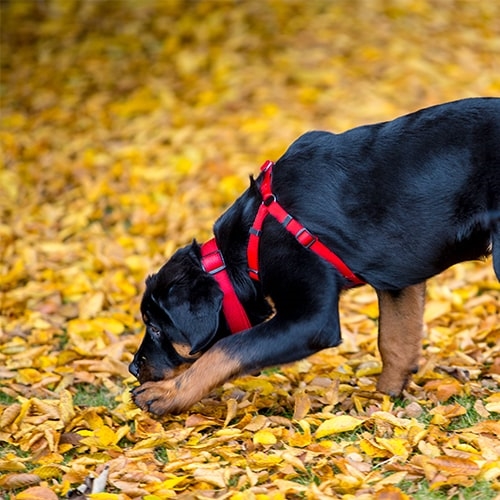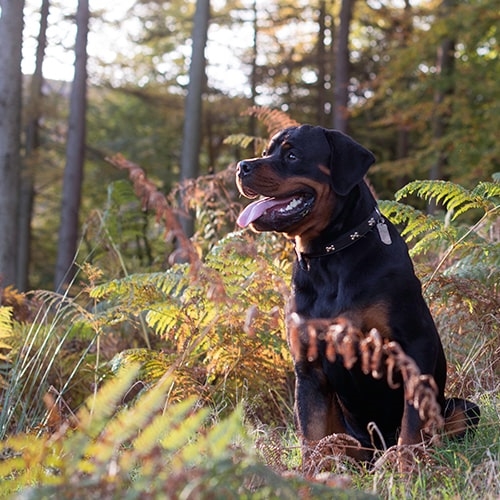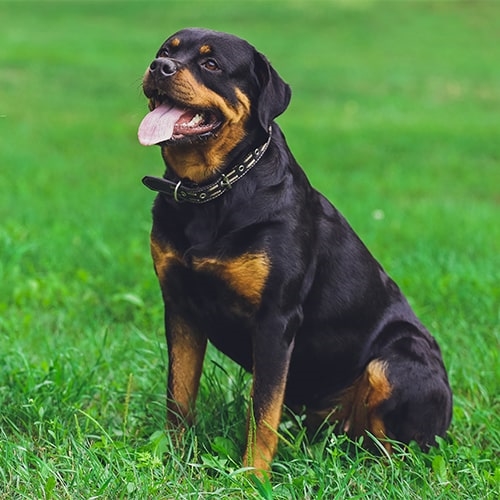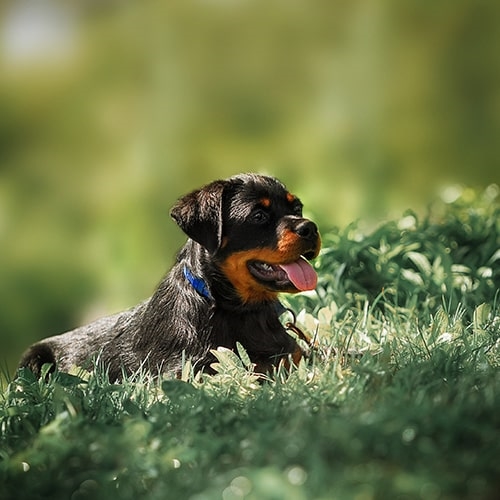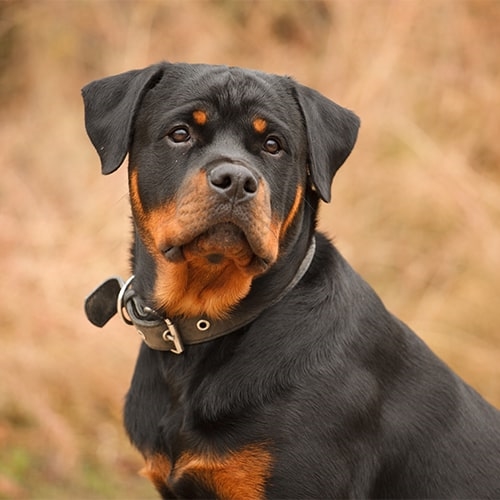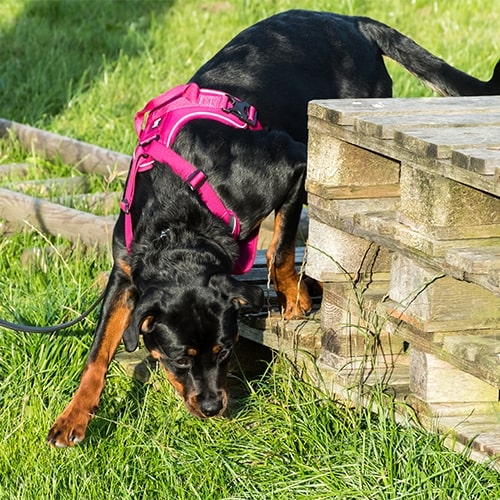| Size | Large |
|---|---|
| Average height | 54-69 cm |
| Average weight | 35-60 kg |
| Average lifespan | More than 10 years |
| Minimum exercise (per day) | 2 hours |
| Coat length | Short |
| Minimum cost (per month) | £105 |
Rottweilers are loyal dogs, naturally protective and can fit in well with family life if well trained and kept occupied.
Rottweilers are intelligent, large, powerful dogs. They thrive in a home with someone who understands the breed and recognises the need for early socialisation and consistent, reward-based training.
Common health problems in Rottweilers
Rottweilers can be sweet dogs and fit in well in the right households, but unfortunately they are known to be more prone to certain health problems. This is due to their pedigree breeding. Often, Breed Clubs will also be able to provide advice on what tests your breed may need and where to get these done. If you buy from a breeder, both parents should have been screened for certain conditions. Make sure the parents of your puppy have had the relevant health screening to reduce the chances of your puppy being affected by these upsetting conditions.
Some of the conditions Rottweilers more commonly develop include:
- Heart problems – including subaortic stenosis (SAS), a narrowing of the passage leading out of the heart which can cause a heart murmur, fainting and sudden death. Dogs should be screened before breeding.
- Cruciate ligament damage – a torn ligament in the knee.
- Elbow dysplasia – where the elbow joint doesn’t fit together perfectly, which will eventually lead to arthritis. Before breeding, dogs should be screened by x-rays through the BVA/Kennel Club Elbow Dysplasia Scheme.
- Hip dysplasia – where the hip joint doesn’t fit together perfectly, which will eventually lead to arthritis. Before breeding, dogs should be screened by x-rays through the BVA/Kennel Club Hip Dysplasia Scheme.
- Juvenile Laryngeal Paralysis and Polyneuropathy – progressive failure of the nerves controlling the voice box and the back legs – a DNA screening test is available.
- Inherited eye diseases – including multi ocular defect, multifocal retinal dysplasia, and persistent pupillary membrane. There are screening tests for these.
- Osteochondrosis dissecans (OCD) of the hock (ankle), shoulder or stifle (knee) – a problem with the cartilage causing joint pain and limping.
- Certain cancers – especially aggressive bone cancer (osteosarcoma) and lymphoma.
- Hot spots (acute moist dermatitis) – patches of itchy, sore, infected skin.
Caring for your Rottweiler
Rottweilers are intelligent and active dogs that require plenty of things to keep them active in body and mind. Consistency is key with training. They are incredibly strong so shouldn't be left unsupervised with children. You'll need to have plenty of time to spend with your dog if you're considering this breed.
If supervised and well socialised they should be OK with teenagers, but they may not be a suitable pet for homes with young children.
Rottweilers and barking
As with any dog, you can expect a Rottweiler to make a bit of noise every now and again. They’re protective and will alert you to comings and goings. If you’re having trouble with excessive barking, we recommend seeking the advice of an accredited behaviourist.
Training and socialisation
Because they’re so powerful, Rottweilers need an experienced owner who understands them and knows how to train them using positive, reward-based training.
Rottweilers will need socialising from a young age so they grow up to be confident and calm. They need positive reinforcement when being trained. Rottweilers are intelligent and you will find they pick up new things quickly. With the right training they will be loyal, well-mannered dogs.
Rottweilers aren’t more prone to barking or being destructive than any other dog if left alone. Dogs prefer company for as long as possible during the day. We recommend you never leave any dog alone for more than four hours as this can cause them to become distressed, bored or lonely.
Exercise
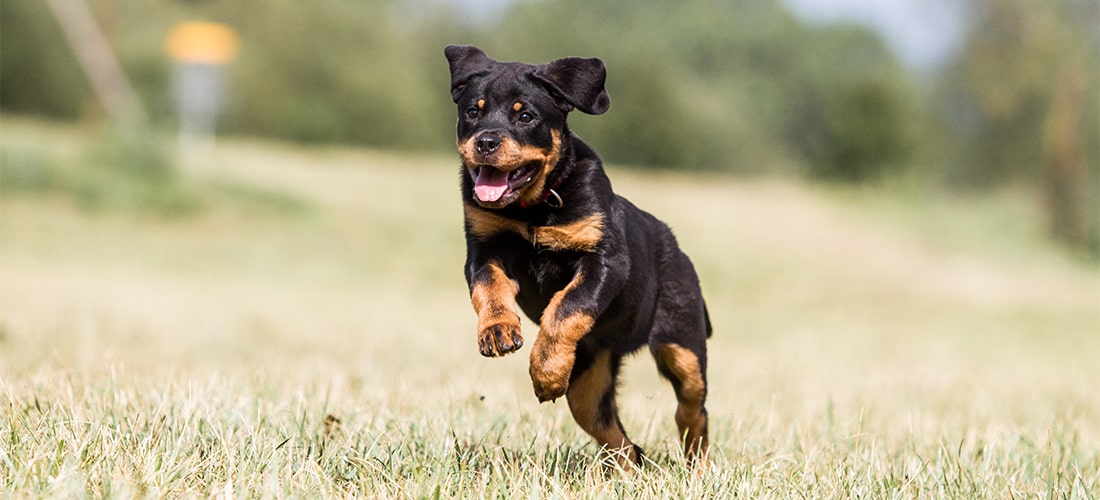
Rottweilers are very active and will need lots of exercise and training to keep them happy and occupied.
You should give your Rottweiler at least two hours of exercise every day. This should include going for interesting walks with extra playtime, having time in a secure garden and plenty of thinking games on top. You can find out how much exercise your dog needs, or even find exercises you can do together.
If they have good recall, Rottweilers can go off lead in safe environments.
Grooming
Rottweilers have short coats that are fairly low-maintenance. A weekly brush should be enough to stay on top of any dead hairs and keep their coat looking shiny. They don’t shed too much, but will shed more in spring and autumn so you may want to brush them more often during these times.
Rottweilers and children
Rottweilers bond strongly with their family but need to be treated with respect. Given enough daily exercise and training, they can make great pets for families with older children and will devote themselves to all of you.
We wouldn’t recommend Rottweilers for families with younger children and babies, as young children sometimes don’t understand how to behave around dogs. Although they are loyal, they can also be protective so children and adults need to know when to give them space.
Always supervise children and vulnerable adults with your Rottweiler and make sure you can recognise the signs of unhappiness or anxiety in your dog to help avoid any conflicts. You should always teach children how to approach and play with dogs with care and kindness, to prevent any issues.
Rottweilers and other pets
As long as they are well socialised from a young age, Rottweilers should get along fine with other dogs. However they have strong herding and protective instincts so introductions always need to be done carefully.
You’ll need to be very careful with other family pets that aren’t dogs. Even if they are in a home with them from a young age, you shouldn’t leave a Rottweiler unattended with another pet, especially small pets.
Food
Your Rottweiler’s diet will vary depending on their age. You’ll need to feed them a complete, commercial dog food to keep them slim and healthy.
Your vet will be able to tell you how much your dog should be eating. It’s usually recommended to split their daily allowance into two meals. If you give your dog an occasional treat or use treats for training, remember to take this into account and reduce their daily food allowance. Treats shouldn’t make up more than 10% of their daily calorie intake as it can unbalance their diet.
You should try to feed your dog at the same time every day to get them into a routine. Remember to leave a gap after eating and before exercising.
Rottweilers have a natural guarding instinct, so may sometimes become possessive over things like their food. Make sure wherever you feed your dog is a quiet environment and that they don’t feel they need to guard their food.
The cost of owning a Rottweiler
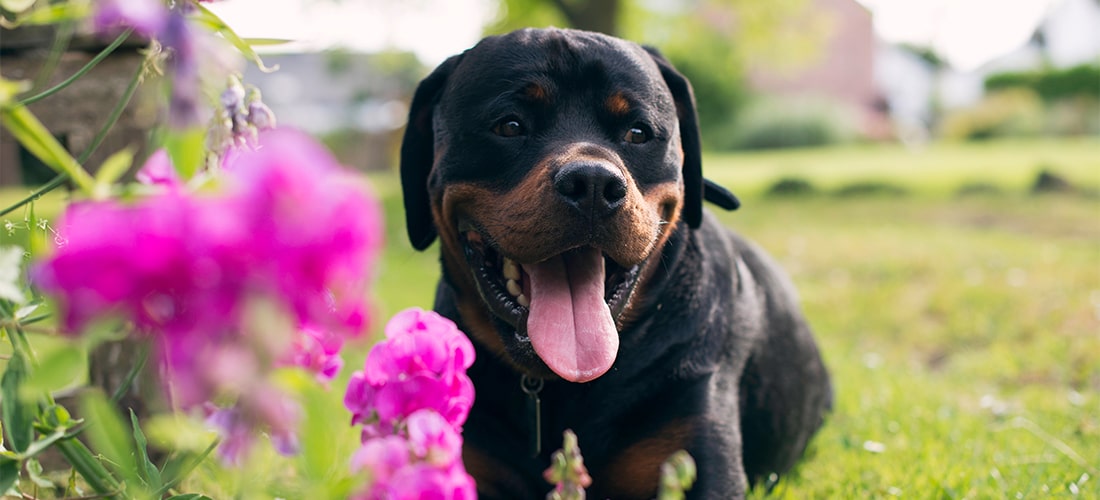
Having a Rottweiler will cost a minimum of £105 per month after purchase and set-up costs and up to £17,000 across their lifetime.
Costs you’ll need to think about include:
Purchase costs
Adopting an adult dog from a rescue centre may be a more cost-effective option, as well as having the added advantage of offering a home to a pet without one – check if the rehoming centre you’re looking at asks for a donation for rehoming.
If instead you’re buying a Rottweiler puppy from a breeder, you’ll need to factor in this cost. Beware unusually cheap puppies as they could come from a puppy farm. If you want to buy a pedigree puppy, we recommend looking for a Kennel Club Assured breeder as they have to do extra health tests and meet high standards.
Set-up costs
- Puppy vaccines – if you rescue a dog, reputable centres will often vaccinate them for you. Remember that ongoing booster vaccinations will be needed to continue their immunity.
- Neutering – you should usually arrange for your dog to be neutered at around 6-12 months old, though your vet will be able to advise you exactly when is best. Check prices at your local practice as these will depend on your vet and where you live. Some rescue centres will neuter any dogs they rehome, saving you this cost.
- Equipment – including a collar and tags, lead, harness, dog beds, dog bowls, pet-safe toothpaste and toothbrushes, grooming brushes and toys. Keep in mind that all these will need to be replaced with wear or damage or if your dog outgrows or damages them!
Ongoing costs
- Food.
- Preventive healthcare – budget for routine vet visits to help stop your dog getting ill and catch any problems early. They need annual check-ups, vaccinations and regular flea and worming treatments. Check if your vet offers a health care plan as this can help spread the cost throughout the year.
- Vet bills* or pet insurance – if you don’t have pet insurance and your dog needs veterinary treatment for an injury or illness, costs can rapidly mount up. Check what’s covered and what isn’t when comparing policies.
- Accessories – including lots of poo bags, replacing worn toys and grooming accessories, buying doggy toothpaste and any other extras they might need.
Other costs
- Training – basic training is very important and dogs can benefit from formal classes. Some dogs may have, or develop, behavioural problems which might need professional management.
- Boarding – you may also need to budget for boarding or dog sitting costs if you are planning to go away from home on holiday.
- Dog walkers/day-care – you might consider a professional dog walker to keep your dog happy and healthy if you’re unable to get out with your dog enough yourself, or to look after them during the day if you need to be out for more than four hours.
* It’s always better to plan ahead and budget or get pet insurance in case your pet gets injured or unwell. If you are having difficulty with veterinary costs, you can check if you are eligible for treatment at PDSA here.
When you welcome a new dog into your life, consider getting dog insurance straight away before any signs of illness start. This will give you peace of mind that you have some financial support if they ever get sick.
Fun Facts
- Many Rottweilers snore quite loudly – get your earplugs ready if you’re thinking of getting one.
- Rottweilers can often think they are lap dogs despite their huge size and might try to sit on you for a cuddle.
- Because they have a strong herding instinct, Rottweilers will sometimes lean on you or gently try to bump your family along.
- They are always black with the same brown markings on their faces, chests and paws.
Getting a Rottweiler
Do plenty of research before you get a Rottweiler. These large and active dogs were originally bred for herding livestock and pulling carts, so you need to make sure you have the time to give them plenty of exercise.
Historically, many Rottweilers had their ears ‘cropped’ as puppies or young dogs, to make them look a particular way. This is when a section of ear is removed to make them stand upright. This can make it more difficult for the dog to communicate with other dogs and puts them through the stress of surgery they don’t need. It’s illegal to crop a dog’s ears in the UK so you shouldn’t ever see this in any puppies now. In the UK, tail docking is mostly banned (with certain exceptions in Scotland). If you come across a breeder or vet cropping ears or docking tails and you’re worried, you can speak to the police or the RSPCA.
Rehoming centres
There are plenty of rescue centres across the country where you may find a Rottweiler. Breed-specific rescues that specialise in Rottweilers are out there too. You’ll need to ask any rescue centre about the dog’s history to make sure they will be comfortable in your home. Good rescue centres should let you know of any health and behaviour problems.
Breeders
If you buy a Rottweiler puppy from a breeder, make sure your puppy will be well socialised and have all necessary health checks and vaccinations. We recommend looking for a Kennel Club Assured breeder as they meet higher standards. We've put together some advice to help you find a good breeder.

